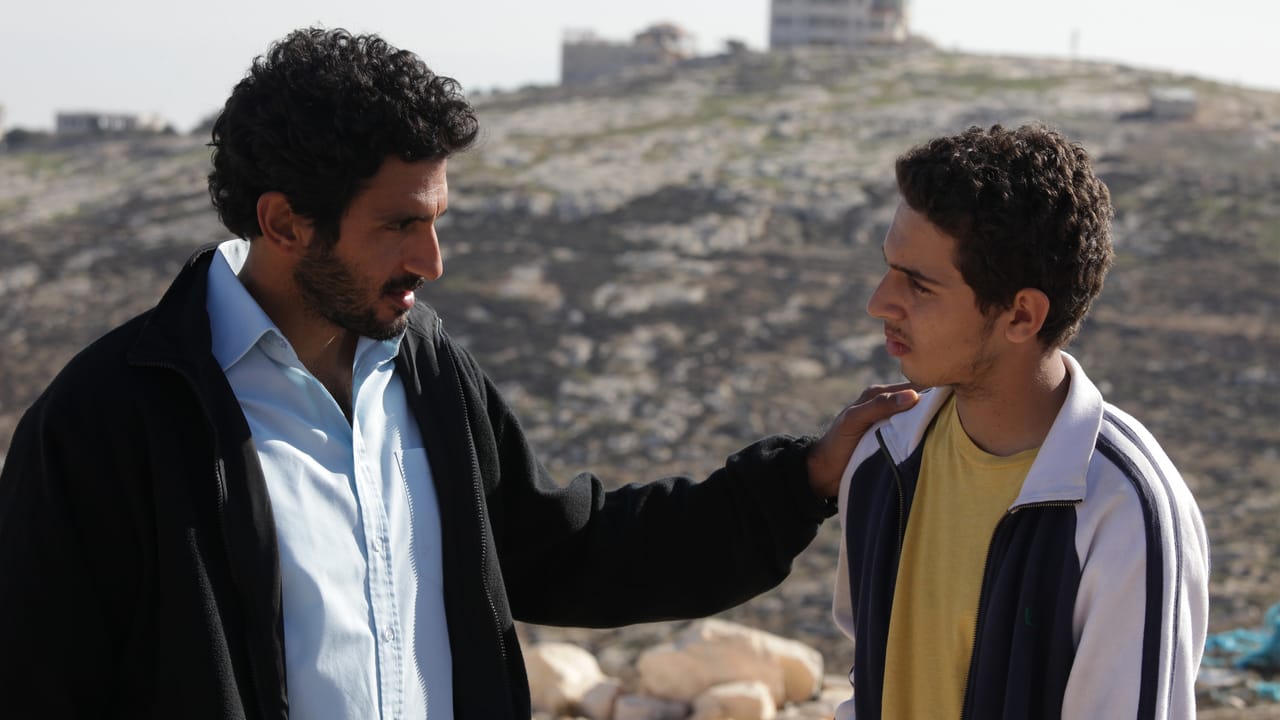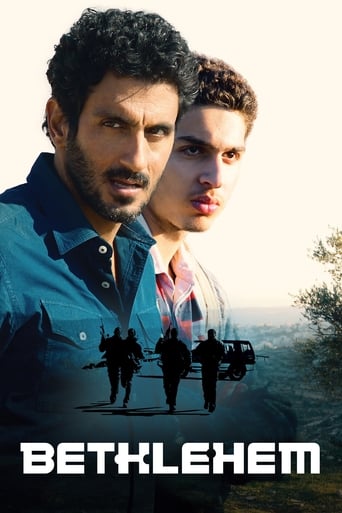


The film makes a home in your brain and the only cure is to see it again.
... View MoreThe movie runs out of plot and jokes well before the end of a two-hour running time, long for a light comedy.
... View MoreA film of deceptively outspoken contemporary relevance, this is cinema at its most alert, alarming and alive.
... View MoreMostly, the movie is committed to the value of a good time.
... View MoreBETHLEHEM Viewed at the Budapest Israeli Film Week, Dec. 5, 2016 An Israeli Agent and His teenage Palestinian Informant Bethlehem (hebrew: בית לחם) is a 2013 Israeli drama directed by first time helmer Yuval Adler and takes place during the Al-Aqsa second Intifada around 2004 and tells the story of the complex relationship between an Israeli Secret Service officer who speaks Arabic and is trying to avert a major suicide bombing attack, and his teenage Palestinian informant-protegé, Sanfur, who shuttles back and forth between all belligerent sides. Main cast, all first time screen actors and all perfect in their roles.Tsahi Halkevi as the Israeli agent ~ (star charisma) Shadi Mar'i as Sangur the young Palestinian informant Hitham Omari as Radaei, The Palestinian militants leader Running time 99 minutes. The Belgian production company "Entre Chien et Loup" is noted for making hard hitting off mainstream films and the name which means "Neither Dog nor Wolf" is a perfect metaphor for this movie which is neither Pro-Israeli, nor Pro-Palestinian, but, if anything, against the madness on both sides. Both central actors, the protective agent and the conflicted boy, are extremely sympathetic so that you can't help rooting for both of them to come out on top. Unfortunately the rules of the deadly Intafada game are not going to let that happen. The city scapes of Jerusalem and to a lesser extent Bethlehem are more than mere settings -- something like living organic geography. All in all this is a non-stop thriller that brings the Intifada -- the Palestinian uprising against the far more heavily armed Israeli establishment -- right into your living room or your lap depending where you are watching it. Tanks and pellet guns against rock throwing mobs - grenades when necessary -- kalishnikovs -- in your face. Industrial strength film making with totally realistic acting all around -- so realistic it's chilling. Actually more Arabic is heard than Hebrew, and a nifty touch is that the Israeli Intelligence agent, Razi, speaks perfect Arabic when he has to, which is much of his screen time. Since the Palestinians are on screen the majority of the time we see the Intifada more from their point of view, while not necessarily approving or disapproving -- and a mixed point of view it is because of the fierce Internal rivalry between the Hamas and Palestinian authority factions. This internal feud is starkly brought into focus when the two factions nearly come to a shootout over the question of how to dispose of the body of a fighter (martyr) killed in action against the Israelis. This is a film that tells it like it is whether you like it or not and introduces some excellent new actors in a very tightly directed and spellbinding drama apart from whatever politics may or may not be implicit. Both Tsahi Halevi as the handsome. brooding Israeli agent and Shadi Mar'l, the teenage Palestinian caught in the middle of a deadly three way tug of war, radiate star charisma each in his own way. Another surprising candidate for Top Ten of 2016.
... View MoreSet in Bethlehem during the current Arab-Israeli conflict, Yuval Adler's film (cowritten with Ali Wakad) concentrates on the life of seventeen-year-old Sanfur (Shadi Mar'i) an Israeli Arab trying to survive in the midst of almost impossible conflict. Cultivated at an early age by Israeli Secret Service officer Razi (Tsahi Halevi) to be a spy for the Israeli cause, he reports on the activities of the Palestine Liberation Front and Hamas. At the same time he fulfills the same role for the PLF, led by thuggish man Badawi (Hitham Omari) who has known Sanfur since childhood. Sanfur twists and turns, telling the stories that both Razi and Badawi want to hear until the complications of his life become too difficult to manage, with tragic consequences.BETHLEHEM looks at the ways in which Sanfur's life is dependent on family values as he is morally obliged to avenge the death of his older brother İbrahim (Tarik Kopty), while at the same time trying to conceal his association with Razi from his father Nasser (George Iskandar). Familial traditions are so strong that the younger siblings have little or no power of self-determination. Hence we feel for Sanfur as his face becomes more and more contorted with pain as he tries to maintain an urbane façade while fulfilling impossible tasks.As far as the civil war is concerned, the film suggests that involvement is very much a badge of male power. By carrying guns and patrolling the streets in search of enemies, the young man (Palestinian and Israeli alike) feel that they are somehow committed to a cause, giving them the excuse to indulge in pointless violence. Sanfur becomes embroiled in that culture, even though he is manifestly unsuited for the task.Set in a series of dingy rooms and dark passages in a ruined city, the film creates an underworld in which concepts of "good" and "evil," or "right" and "wrong," simply do not exist. No one, it seems, can grow up unaffected (or should it be corrupted) by the civil war, which seems never-ending, despite continued calls for a ceasefire.
... View MoreWhen we look at guilt as a the key element used in the plot of "Bethlehem", we find that it is not easily possible to define victim and perpetrator. Even though the characters were never totally free of their responsibility, they were mostly shown in the context of external forces that were stronger than their individual possibility to chose alternatives. These external forces created moral dilemmas in which the characters were caught up.Some of these were for example the codex of Arab family honor conflicted with Sanfur's individual decisions and his fathers opinion about his future in context of his brothers death. There was the psychological issue of a double agent and his personal involvement with his asset conflicting with his orders in the context of his career. Also his rationalism was blurred in the face of a hinted sexual relationship with his colleague, his ambition and his responsibility as a father and husband. Some others dilemmas were also informative for the viewer in order to understand the environment of the plot. In an almost documentary storytelling the film tells about the conflict between Palastinian and Bedouins within the leadership of the Palestinian/Arabic/Islamic militia, the fight for political strength of the Palestinian autonomy or the Al-Aqsa resistance facing religious fundamentalism. Taking these and other issues into account - the characters couldn't escape their moral dilemmas even though they wanted. They had little choices and none of the decisions were not understandable. So in the end everyone was guilty, but the damage done was greater than caused by an individual decision. Therefore this movie shows paradigmatic how the people in this complex conflict can not easily stop ongoing violence. From a western point of view this helps to understand also how naive it is to simply ask the war parties to stop their fighting. It makes us understand that once you are trapped in the spiders net of violence, you cannot stop it from evolving. In this way the movie has done a great job. But what is the second, less obvious, but more scary conclusion drawn from that? Violence is unavoidable and you cannot escape your destiny. But if this so, and everything is determent – how are you responsible for your actions? Another subject where we know this concept from is Qadar, the concept of predestination in Islam belief, which says that everything is written. Higher forces drive your actions and you cannot escape your destiny - doesn't this therefore make you less guilty? This would question legacy for a democratic legal system used in a warlike world as in this conflict. And also made me see the violence on a daily base in a different light.On the same when I saw the movie, a stabbing attack occurred in Jerusalem, clumsy executed by two teen aged Palestinian girls. The attempted terrorist attack and the murder shown in the movie are not completely alike, but yet it were both Palestinian teenagers conflicted with brutal and archaic murder. I would never justify terrorism, but in the light of what I have seen in the movie, I would say it gave me an idea of how people are driven to those acts. It was the first time I ha the glimpse of an idea how people could chose to do such things to others. I wouldn't say I feel empathy, but still I doubt that these people would have chosen their destiny if they had a real choice. And this is what I mean with scary conclusion – how should a society and legacy deal with that, if wrong is done to you, but the cause is not to be found in an individual guilt?The end, which in itself provides a strong symbolic picture (a master is killed by its tool / father is killed by its son) shows us what is left: Archaic violence is what is left. Archaic violence as a cry for help as it exceeds all necessary measures.
... View MoreIn Bethlehem, Israeli director Yuval Adler's diagnoses the Israeli-Palestian stand-off as a hopeless excess of testosterone. The largely male cast is in constant action, pacing, plotting, strutting, risking, as if they're addicted to a pumped-up adrenalin. Mainly strutting. Two rivals meet, tease, then race up a building's stairs. From the top the winner throws his rival to his death. Boys will be boys.The opening and closing scenes set up the coming of age of the 17-year-old Palestinian Sanfur. His name comes from the Smurfs but no softness or play is allowed him. In the first scene he accepts his friends' dare to take a kalyshnikoff shot to an armoured vest. He's wounded. In the last shot he sits in tears beside the Israeli Secret Service agent Razi, whom he has just killed, first shooting him, then bashing in his skull. The latter detail makes the kill more direct, more emotional. In his subsequent remorse and grief Razi's last trace of Smurf emerges. This coming of age is a Bar Mitzvah on steroids.Sanfur's older brother Ibrahim is a prominent terrorist/freedom fighter, supported by both Hamas and Al Aqsa. The two anti-Israel armies almost come to blows in their own stand-off, over who will provide Ibrahim's last honours. Further fracturing the movement, the Arab groups disdain of the Bedouins, which only fires the ambition of another killer, Badawi. Badawi coerces Sanfur into killing Razi to atone for his collaboration. The adrenalin drives the Arab men into constant fights among themselves as well as against Israel. And as the Israeli intelligence seeks troubled Arabs to play, to make collaborators, the Arab is put to war within himself as well. So, too, the Israeli. Razi saves Sanfur from the plot to kill Ibrahim, for the given reason that he's too important a source to lose, but also because he has developed genuine feelings for the "buddy" he has counselled and supported — and exploited — for several years.Razi bullheadedly rushes to his fatal meeting despite his wife's warning and the female commander's order that he not go. Characters living on their pumped adrenalin keep the cycle of killing and retribution going. War breeds war but peace does not breed peace. There's no blood in it. For more see www.yacowar.blogspot.com.
... View More